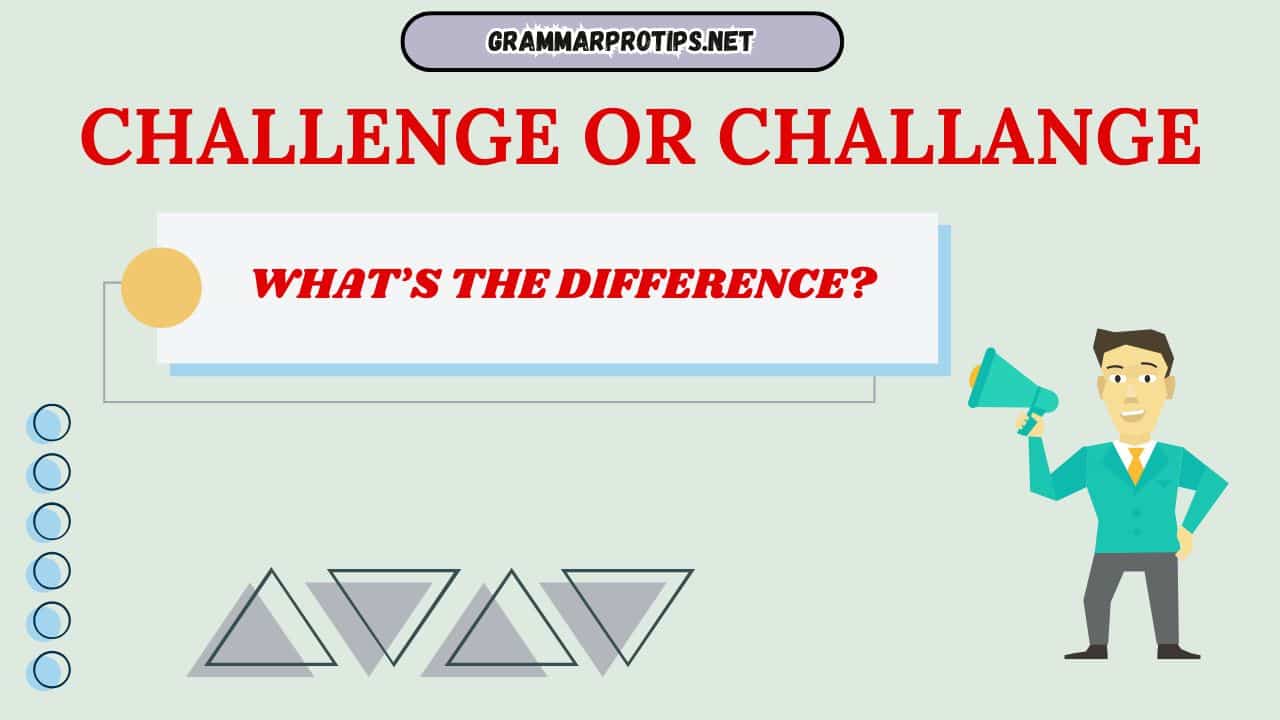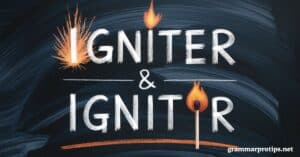In the world of English spelling, mistakes happen, and one of the most common errors revolves around the words “challange” and “challenge.”
These two words are often confused, leading many to question, “What’s the difference?” If you’ve ever found yourself unsure whether to use “challange” or “challenge,” you’re not alone.
In this article, we’ll explore the distinction between the two and why getting the spelling right is important. We’ll also dive into real-life examples, practical applications, and helpful tips to improve your spelling skills.
Understanding the Correct Spelling: “Challenge”
Let’s start by confirming the correct form: “challenge”. This word is not only used frequently in the English language but is also rich in meaning and application.
Definition and Meaning of Challenge
At its core, challenge refers to something difficult or demanding, whether it’s a task, situation, or even a competition.
It tests one’s abilities, often pushing a person to exceed their limits or confront obstacles.
It can also be used as a verb, meaning to invite someone to a contest or to dispute an idea.
Key uses of the word “challenge”:
- As a noun: Refers to a difficult task or competition.
- As a verb: To question or dispute something.
Examples of Correct Usage
- Noun Usage: “Climbing the mountain was a real challenge for the team.”
- Verb Usage: “I challenge you to a game of chess.”
These uses are prevalent across various domains, from casual conversations to formal writing. For example, in a business context, you might say:
- “Our company is facing a significant challenge with our expansion efforts in Asia.”
Synonyms for “Challenge”
When writing, using synonyms for “challenge” can add variety and richness to your vocabulary. Here are a few alternatives:
- Obstacle
- Test
- Difficulty
- Trial
- Hurdle
For example, you could say:
- “The obstacle we encountered slowed down our progress.”
But it’s essential to remember that “challenge” has a slightly different nuance than these synonyms, which often emphasize more physical or tangible barriers, while challenge can also include intellectual or emotional tests.
The Misspelling: “Challange”
Now that we’ve covered “challenge” in detail, let’s turn to the misspelling “challange”.
Many people mistakenly use “challange” in place of “challenge,” but it’s not the correct form.
Despite being a common error, it can impact the readability and professionalism of your writing.
Why Is “Challange” a Misspelling?
The root cause of the misspelling “challange” lies in the fact that English words sometimes don’t follow predictable spelling patterns.
When words end in the “ge” sound, they often follow a particular rule, but “challenge” is an exception to that rule.
The “e” at the end of “challenge” is necessary for the correct spelling. Without it, we get the misspelling “challange.”
Common Sources of Misspelling
The mistake often happens due to:
- Overcompensation in phonetics: The pronunciation of “challenge” can make the extra “e” seem unnecessary.
- Typographical errors: In some cases, it could simply be a typo while typing quickly.
- Autocorrect confusion: Sometimes, your device’s autocorrect feature might suggest “challange,” though it’s wrong.
Scenario: Incorrect Use in Writing
Let’s say you’re sending an email to a colleague, but you accidentally misspell “challenge” as “challange.” Here’s how it might look:
Subject: Facing a New Challange in Our Work
Dear Emily,
I hope you’re doing well. I wanted to update you on a new challange I’m facing with the software rollout. It’s a difficult task, but I’m confident we can solve it together.
Best,
John
While the context of the email is understandable, the misspelling “challange” may detract from your professionalism.
Using the incorrect form may lead others to assume you don’t pay attention to details, which can affect how seriously they take your work.
Spelling Errors in Professional Writing
In professional writing, such as business emails, reports, or presentations, spelling mistakes like “challange” can lower your credibility.
Proper spelling is part of effective communication it shows you care about accuracy and helps ensure your message is clear.
How to Avoid Misspelling “Challenge”
- Spellcheck Tools: One of the easiest ways to avoid spelling mistakes is to use spelling and grammar check tools, which are built into most word processors and email platforms.
- Proofreading: Before sending an email or submitting a document, take a moment to proofread it. If you’re unsure about a word, look it up in a dictionary.
- Visualize the Word: Break down the word into parts. Think of the “-ge” ending as part of the correct spelling.
- Practice: Regularly write the word “challenge” and other commonly misspelled words to reinforce correct spelling.
Why Spelling Matters
Good spelling is more than just a grammatical requirement; it’s a key component of effective communication.
The importance of spelling can’t be overstated, especially in professional and academic writing. Proper spelling ensures that the reader grasps the intended meaning without distractions or misunderstandings.
Scenario: Academic Paper
Imagine you’re writing a research paper on overcoming personal obstacles. Using the correct spelling of “challenge” will help ensure your ideas are communicated effectively.
Example of Proper Use in an Academic Context:
- “Overcoming challenges is essential for personal growth and development. It teaches resilience and determination.”
Now imagine if you had used “challange” in the same context. This subtle mistake could undermine the quality of your work and create confusion.
Correct vs. Incorrect Spelling in Writing
Let’s compare the correct spelling of “challenge” with the misspelling “challange”:
| Correct Spelling | Incorrect Spelling |
|---|---|
| “I accepted the challenge.” | “I accepted the challange.” |
| “The team faced many challenges.” | “The team faced many challanges.” |
| “We need to challenge the results.” | “We need to challange the results.” |
In each of these examples, the misspelled word could confuse readers or reflect poorly on your writing skills.
Understanding the Challenge in Different Contexts
Challenge appears in many contexts, from sports to business to personal life. Let’s explore how it can be used across various scenarios.
Example 1: In Business
In a business setting, challenge can refer to obstacles a company might face, whether in market competition, product development, or team collaboration.
Business Context Example:
- “The company faces a significant challenge in maintaining market share against competitors.”
Example 2: In Sports
In sports, a challenge often refers to a competitive situation where two parties are invited to compete or prove their skill.
Sports Context Example:
- “The tennis player will challenge the reigning champion in the final match.”
Example 3: In Personal Life
In daily life, challenges often involve tasks or experiences that push a person beyond their comfort zone, whether it’s a career challenge, personal growth challenge, or overcoming fears.
Personal Life Context Example:
- “The decision to move to a new city was a major challenge for Sarah, but it opened up new opportunities for growth.”
Example 4: Intellectual or Academic Challenges
Academics often use challenge when questioning ideas or theories, pushing for deeper understanding or refutation of arguments.
Academic Context Example:
- “The student challenged the professor’s hypothesis in the research paper.”
Clarifying Misspellings in Everyday Writing
It’s easy to get caught up in spelling mistakes, especially when writing quickly. Misspelled words are common in informal writing, but they can also sneak into formal documents. Here are some tips to help you avoid these errors:
- Know Common Mistakes: Words like “challange”, “definately”, and “recieve” are often miswritten. Stay alert to these common misspellings.
- Proofreading: After writing your document, take a break before proofreading. This refreshes your mind and helps you spot errors more easily.
- Ask for Help: If you’re unsure about the spelling of a word, don’t hesitate to ask a colleague or use an online spelling tool.
Conclusion: The Importance of Correct Spelling
In summary, “challenge” is the correct spelling, while “challange” is an incorrect version of the word.
Spelling errors like this can confuse readers and lower the professionalism of your writing. Whether you’re composing an email, a report, or a personal blog post, paying attention to spelling is essential for clear and effective communication.
As you continue writing, remember that small mistakes can have big impacts.
Regular practice and attention to detail will help you avoid common misspelled words and improve your overall writing.
Remember, spelling isn’t just a grammatical task; it’s an essential part of effective communication.
So the next time you need to spell “challenge”, take a moment to double-check. After all, good writing is about getting the little things right!
Read more knowledgeable blogs on Grammar Pro Tips

Sienna Mauldon is a passionate writer and grammar expert. On her blog, she shares easy-to-follow guides to help readers master grammar rules and improve their writing. With a love for language and teaching, Sienna makes grammar simple and fun for everyone, from beginners to experienced writers.








